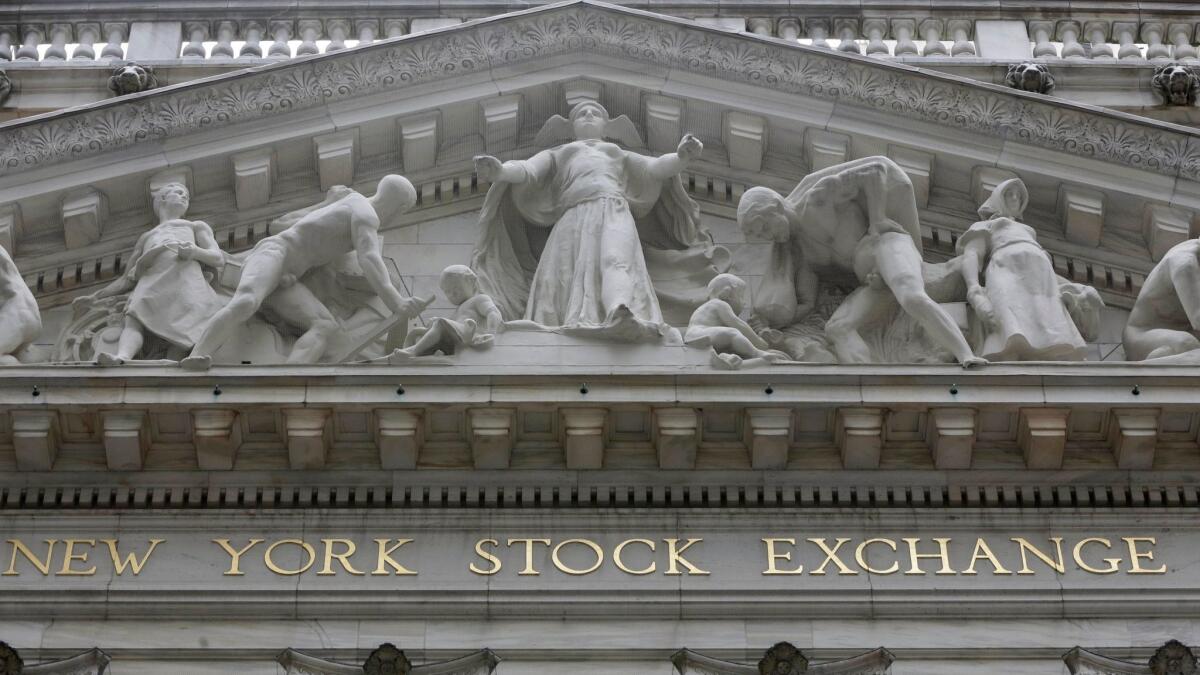U.S. stocks sink for the third day in a row

Investors were in a selling mood at the end of a mostly subdued week of trading, sending U.S. stocks lower for the third day in a row Thursday.
Energy stocks led the broad decline, which gathered momentum in the final hour of trading before the long Easter holiday weekend. The slide marked the lowest close for the stock market since Feb. 13 and came on a day when several major banks reported quarterly results, kicking off the company earnings season.
Traders also weighed the potential for rising geopolitical tensions after news that the United States attacked an Islamic State tunnel complex in eastern Afghanistan with the largest non-nuclear weapon that the U.S. military has ever used in combat.
Bond yields continued to drop. Gold surged to its highest level since early November. The dollar weakened versus the yen and euro.
âInvestors have plenty of reasons to be cautious and have become more cautious in recent weeks,â said Erik Davidson, chief investment officer at Wells Fargo Private Bank. âThe market had a great run, and it just hasnât been given a lot of reasons for much follow-through on that.â
The Standard & Poorâs 500 index slid 15.98 points, or 0.7%, to 2,328.95. The Dow Jones industrial average declined 138.61 points, or 0.7%, to 20,453.25. The Nasdaq composite index fell 31.01 points, or 0.5%, to 5,805.15.
Small-company stocks fell more than the rest of the market. The Russell 2000 index sank 13.96 points, or 1%, to 1,345.24. More stocks fell than rose on the New York Stock Exchange.
The decline deepened the marketâs losses for the month.
Bond prices edged up. The yield on the benchmark U.S. 10-year Treasury note fell to 2.23% from 2.24%.
Gold, which investors often buy in times of global uncertainty, climbed $10.40 to $1,288.50 an ounce.
Oil prices went up as traders shrugged off an International Energy Agency report that said that demand growth for oil will slow for a second consecutive year this year.
Benchmark U.S. crude rose 7 cents to $53.18 a barrel. Brent crude, used to price international oils, rose 3 cents to $55.89 a barrel.
Even so, energy stocks fell sharply. Chesapeake Energy was the biggest decliner in the S&P 500, dropping 4.2% to $5.89.
After a week of mostly subdued trading without major new economic data or company news, investors got a look at the first batch of big bank earnings Thursday.
Several banks reported better-than-expected results thanks to improved revenue from trading and rising interest rates. That gave the stocks a boost early in the day, but their gains faded.
Citigroup fell 0.8% to $58.04, JPMorgan Chase sank 1.2% to $84.40, and PNC Financial Services slipped 0.2% to $115.80.
Wells Fargo sank 3.3% to $51.35 after Warren Buffettâs Berkshire Hathaway sold some of its stock in the lender to avoid being designated a bank holding company. Wells also reported flat quarterly earnings, reflecting continuing struggles to recover from its sales practice scandal.
Read more: Accounts scandal and wary customers take a toll on Wells Fargo earnings Âť
Pier 1 Importsâ latest quarterly results failed to impress investors. The companyâs shares slumped 9.1% to $6.59 after the home decor retailer reported disappointing sales.
U.S. Steel fell 5.9% to $29.42 as investors weighed the effect of a wastewater spill at one of the companyâs steel plants in northern Indiana. Federal officials were waiting for the results of tests aimed at determining whether a potentially carcinogenic chemical entered Lake Michigan during the Tuesday spill.
Tesla climbed 2.4% to $304 after Chief Executive Elon Musk said the company will unveil an electric cargo truck in September.
Trovagene leaped 21.3% to $1.04 after the San Diego developer of diagnostic technology announced a new board member.
Major stock indexes overseas closed mostly down.
Germanyâs DAX fell 0.4%, while Franceâs CAC-40 shed 0.6%. Londonâs FTSE-100 lost 0.3%. Tokyoâs Nikkei 225 and Sydneyâs S&P-ASX 200 each slid 0.7%. Hong Kongâs Hang Seng fell 0.2% after a report showed Chinaâs export growth accelerated in March, while import growth cooled. Seoulâs Kospi climbed 0.9%.
The dollar continued to weaken the day after President Trump said in an interview with the Wall Street Journal that the dollar was âgetting too strongâ and that he wonât declare China a currency manipulator.
The remarks helped push the yen to its highest level since mid-November, just after the presidential election. The dollar slid to 109.16 yen from 109.71 yen late Wednesday. The euro strengthened to $1.0612 from $1.0598.
Wholesale gasoline slipped 1 cent to $1.73 a gallon. Heating oil held steady at $1.65 a gallon. Natural gas rose 4 cents, or 1.3%, to $3.23 per 1,000 cubic feet.
Silver rose 21 cents to $18.51 an ounce. Copper rose 3 cents to $2.57 a pound.
U.S. markets will be closed Friday for the Good Friday holiday.
ALSO:
Man dragged off United flight got a concussion and other injuries, attorney says
Trump tells China: Help us rein in North Korea and weâll back off on trade issues
L.A.âs housing costs make it harder for companies to keep workers here, survey finds
UPDATES:
2:55 p.m.: This article was updated with closing prices, context and analyst comment.
1:20 p.m.: This article was updated with the close of markets.
10:45 a.m.: This article was updated with market prices, context and analyst comment.
This article was originally published at 6:55 a.m.
More to Read
Inside the business of entertainment
The Wide Shot brings you news, analysis and insights on everything from streaming wars to production â and what it all means for the future.
You may occasionally receive promotional content from the Los Angeles Times.










